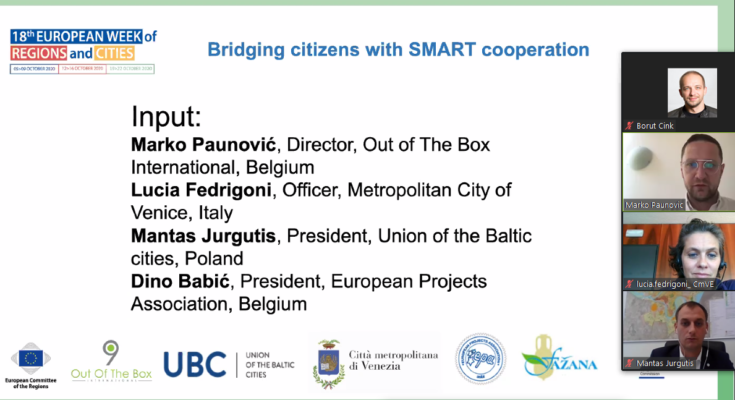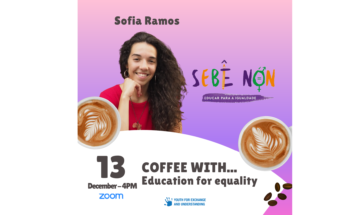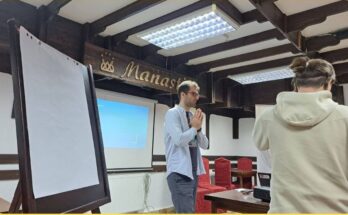This year’s edition of The European Week of Regions and Cities was fully digital due to COOVID-19 pandemic and spread over three consecutive weeks, each dedicated to one timely topic: Empowering Citizens, Cohesion & Cooperation, and Green Europe.
Our session took place on 7th, October in line with the Empowering Citizens topic with 150 participants registered. Partners – European Projects Association (EPA), Metropolitan City of Venice, Municipality of Fažana, Out of the Box International and Union of the Baltic Cities presented how to examine and analyze the priorities in cities/communities using citizens’ input, Artificial Intelligence and Information Technology Communication, thus enabling and stimulating inclusive democratic processes.
The first part of the session belonged to Marko Paunovic, the director of Out of the Box International, with the presentation of current rising trends and answering how to increase citizens’ engagement in shaping their communities while developing SMART cities. Real-time information, Decentralizing data centers and decision making, Transparency and other good practices were presented along with OTB’s projects.
The second speaker Lucia Fedrigoni, presented Smart Solutions for the Metropolitan City of Venice. The Multiservice ICT Platform CON.ME – DiMe with 82 online services available to citizens, local businesses and tourists, proven to be very useful during Covid-2019 lockdown. Another smart solution presented is Citizens’ Observatory – a virtual place where citizens and decision-making authorities will be able to exchange and share environmental information, such as flood-related data, through the use of a mobile app and a web-platform. The list of solutions goes on and includes SPID which is an Italian Public Digital Identity System that allows citizens and businesses to access online services of participating public administration and private services providers. WEBMAPP VENEZIA is a smart solution that shares information about tourism, civil society, safety health, environment, sustainable mobility and cycling routes. Finally, Open data ICT Platform ICARUS was presented as a solution aiming at improving passenger intermodal transport connections and easing coast-hinterland sustainable accessibility, thus promoting car-independent lifestyles.
Mantas Jurgutis, President of the Union of the Baltic cities, presented the network and its work. UBC is the leading network of cities in the Baltic Sea Region with around 100 member cities and 7 working Commissions: Cultural Cities, Inclusive and Healthy Cities, Planning Cities, Safe Cities, Smart and Prospering Cities, Sustainable Cities, and Youthful Cities. Through its work UBC promotes EUSBSR (EU Strategy for the Baltic Sea Region) capacity building among cities, regions, businesses, and academia. The goal of the UBC Sustainability Action Programme that is coordinated by the UBC SSC and is closely linked to the EU Strategy for the Baltic Sea Region (EUSBSR) is sustainable development. Currently, this is managed through exchanging know-how and practices between the member cities on pandemic handling and recovery mechanisms as well as concrete cases by urban planners and architects.
The final speaker Dino Babić, the President of the European Projects Association,
presented a multitude of diverse projects, which are the results of smart solutions to the burning issue of connecting communities. The projects were in the field of Agriculture, Economy, Education, Training, Culture, Youth, Employment and Social Affairs, Energy and Natural Resources, Enterprise and Industry, Environment, Regions and Local Development, Research, Innovation and Technology and Tourism and Travel. These projects were implemented through organizations including European Projects association, Informo, Istrian de Dignan – Ecomuseum, European Academy for education and social research and Fazana municipality. The successes achieved were a result of creating online platforms for learning and specialization, and involving citizens in local and regional work which generated communities of practitioners that continue to participate in further development.
Our workshop was in a ZOOM format and it gathered 60 participants who actively participated in the discussions and shared their experiences. In the final part, the participants rated the workshop as inspiring, with fresh ideas and good practices shared on the subject of empowering citizens.





